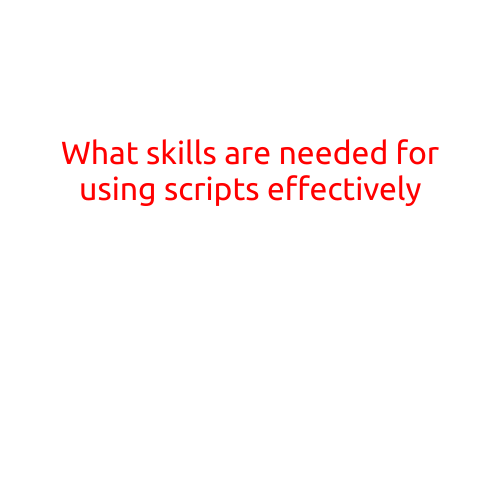
What Skills are Needed for Using Scripts Effectively
In today’s digital age, scripting has become an essential tool for individuals and organizations alike. Scripts allow users to automate repetitive tasks, streamline workflows, and increase productivity. However, using scripts effectively requires a set of essential skills that can be acquired through practice and training. In this article, we’ll explore the key skills needed for using scripts effectively.
1. Programming Fundamentals
To use scripts effectively, you need to have a solid understanding of programming fundamentals. This includes knowledge of syntax, data types, variables, control structures, functions, and object-oriented programming (OOP) concepts. Familiarity with popular programming languages such as Python, JavaScript, or Ruby is a plus.
2. Problem-Solving Skills
Scripting requires the ability to break down complex problems into manageable parts and identify the most efficient solution. Problem-solving skills are essential for debugging scripts and troubleshooting issues. Effective problem-solvers are able to think logically, analyze data, and identify patterns.
3. Troubleshooting and Debugging
Scripting often involves solving complex issues, and the ability to troubleshoot and debug is crucial. This requires attention to detail, patience, and the ability to think creatively. Debugging skills include identifying and isolating issues, using tools to diagnose problems, and implementing fixes.
4. Code Organization and Structure
Effective script writing involves organizing code in a logical and maintainable manner. This requires skills in coding standards, modular programming, and comment-based documentation. Good code organization enables easy maintenance, updating, and sharing of scripts.
5. Automation and System Integration
Scripting is often used to automate tasks and integrate systems. To use scripts effectively, you need to understand how to work with different systems, APIs, and data formats. This requires knowledge of system administration, networking, and data processing.
6. User Interface and User Experience (UI/UX)
When building scripts, it’s essential to consider the user interface and user experience. This includes designing intuitive interfaces, providing clear instructions, and ensuring scripts are user-friendly. Good UI/UX skills help increase script adoption and reduce user frustration.
7. Version Control and Collaboration
In today’s collaborative environments, version control and collaboration are essential. Effective script writers understand version control systems such as Git and collaborate effectively with team members to share knowledge, code, and updates.
8. Documentation and Commenting
Good documentation and commenting are critical for script maintainability and sharing. Effective script writers document code, provide clear explanations of logic and functionality, and use comments to highlight key sections and explanations.
9. Testing and Validation
Script testing and validation ensure scripts work as intended and are free from errors. To use scripts effectively, you need to understand how to test code, identify bugs, and validate output.
10. Continuous Learning and Improvement
Finally, using scripts effectively requires a commitment to continuous learning and improvement. Effective script writers stay up-to-date with the latest technologies, frameworks, and best practices, and continuously refine their skills to meet evolving demands.
In conclusion, using scripts effectively requires a unique blend of programming, problem-solving, and soft skills. By developing these skills, individuals and organizations can unlock the full potential of scripting and achieve greater efficiency, productivity, and innovation.





